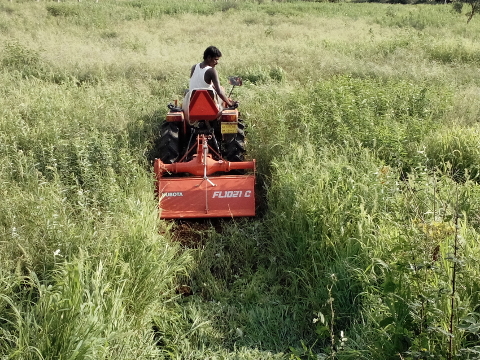
Weed management is the most intensive and expensive farm operation in organic farming and we apply a number of mechanical & manual methods in addition to cover cropping and mulches to minimize weed competition.
Manual weeding is actually quite amusing – while weeding progresses to one end of the plot, new weeds would already emerge at the end where weeding was started. While a number of selective and non-selective herbicides are quick and cost effective in chemical farming, weed management is much more involved in organic farming.
At NaturePinks Gardens, we use absolutely no weedicides for weed management. Instead, our methods include:
Tillage
We plough and rotavate the soil for bed preparation, turning the soil to incorporate crop residues; remove existing weed growth and prepare a seedbed for planting. We however minimize tillage of soil to retain the soil structure and soil life and till when essential.
Mechanical Weeding
We use tractor driven implements, mechanical and power operated weeders to turn the soil after seeding to kill weeds, including inter row cultivation of row crops.
Manual Weeding
We employ manual removal of weeds by hand and using small hand tools around the plant bases of row crops and in the whole plot for crops that are not grown in rows such as onion and garlic.
Mowing and Cutting
We periodically cut back weed growth using sickles or a brush cutter and typically use the cut material as a mulch to cover the soil around the plants.
Cover Crops
We grow beneficial crops that grow fast and shade out weeds. Typically these are legumes such as sunnhemp, horse gram, green gram, pillipesara etc. that also enrich the soil. Cover crops together with mulching has been the most favoured weed management practice at NaturePinks Gardens.
Mulching
We cut back the growth of cover crops and cover the soil with the cut material to suppress weed growth, conserve soil moisture and protect the soil.
Natural Enemies of Weeds
We encourage the multiplication of pests of weeds that keep weeds under check. Due to our methods, we find an increasing population of the beetle Zygogramma bicolorata that feeds on the weed Parthenium hysterophorus, which is a major nuisance in our area.
More on our farm management
Soil Management at NaturePinks
Pest Management at NaturePinks
Weed Management at NaturePinks